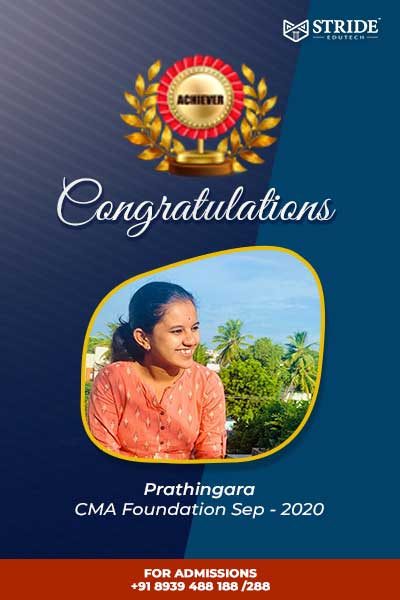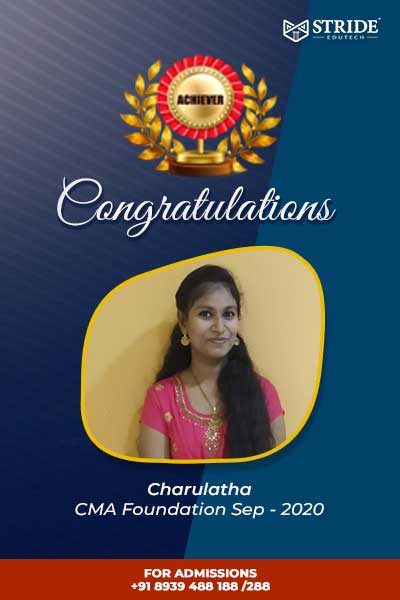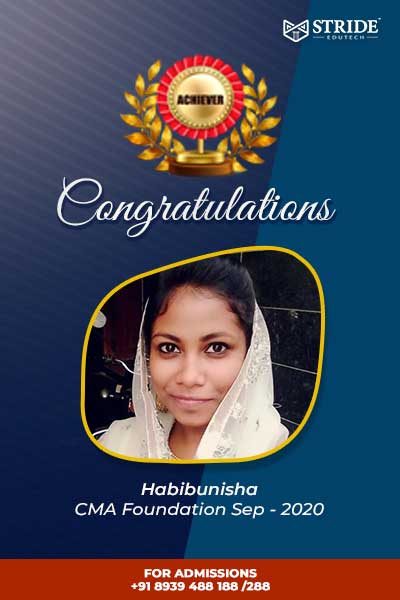Are you looking for a challenging and rewarding career in accounting? If so, the CMA course in India is the perfect choice for you! With its rigorous curriculum and comprehensive training, the CMA course will prepare you for a successful career in the accounting profession.
The following article will assist you in fully comprehending the process of becoming a CMA professional in India and will clearly explain CMA course details, syllabus, career prospects, etc.
Guide to Becoming CMA in India
Cost & Management Accountant is a reputed certification from the Institute of Cost Accountants of India (ICAI), India. People usually get confused between various terms like CMA, ICMAI, CWA, and ICWAI. The Institute of Cost & Works Accountants of India (ICWAI) has changed its identity to The Institute of Cost Management Accountants of India (ICMAI). ICWA course has been renamed as the CMA course. Therefore, there is no difference between ICWAI and CMA. They are the same.
CMA is one of the toughest professional exams in India and usually has a pass percentage between 5% to 25%. CMA is gaining popularity among commerce students contemplating to be professionals in the accounting & finance domain due to its immense industry recognition.
However, before continuing, you need to understand what a cost accountant is and what he performs.
What are the duties of a Cost Accountant?
A cost accountant is a financial professional specialising in tracking and analysing the costs of a company’s products or services. They use this information to help businesses make informed pricing, budgeting, and profitability decisions.
Specifically, cost accountants perform the following tasks:
- Gather and analyse financial data: Cost accountants collect data on all costs associated with a company’s operations, including labour, materials, and overhead. They use this data to create reports that track costs over time and identify areas where costs can be reduced.
- Set standard costs: Cost accountants develop standard costs for products or services, which are the estimated costs of producing or providing them. These standards can be used to track actual costs and identify areas where costs are exceeding expectations.
- Develop and implement cost-saving measures: Cost accountants locate areas where expenses can be cut and create and carry out plans to bring about those improvements. It may involve changing production processes, negotiating better prices with suppliers, or eliminating unnecessary expenses.
- Prepare financial reports: Cost accountants prepare financial reports summarising company operations costs. Managers use these reports to make pricing, budgeting, and profitability decisions.
- Advise management on financial matters: Cost accountants advise management on various financial matters, such as pricing, budgeting, and profitability. They use their expertise in cost accounting to help managers make informed decisions that will improve the company’s bottom line.

Cost accountants typically work in various industries, including manufacturing, retail, and healthcare. They typically have a bachelor’s degree in accounting or a related field. Some employers require certification, such as the Certified Management Accountant (CMA) designation.
What are the types Of Cost Accountants?
There are three main types of cost accountants:
- Financial cost accountants focus on tracking and reporting the costs of a company’s products or services. They use this information to help businesses make informed pricing, budgeting, and profitability decisions.
- Managerial cost accountants use their expertise in cost accounting to help managers make informed decisions about a company’s operations. They may advise on pricing, budgeting, production, or other areas.
- Internal auditors are accountable for ensuring that internal controls are in place and that financial statements are accurate for the organisation. They may use cost accounting techniques to identify areas where costs can be reduced, or inefficiencies can be improved.
In addition to these three main types, there are several other specialised types of cost accountants, such as:
- Cost engineers use cost accounting techniques to design and develop products or services. They may also be involved in setting prices or negotiating contracts.
- Cost analysts use cost accounting techniques to analyse the costs of a company’s operations. They may be responsible for identifying areas where costs can be reduced, or inefficiencies can be improved.
- Cost consultants provide advice and services to businesses on cost accounting matters. They may help businesses develop cost accounting systems, implement cost-saving measures, or prepare financial reports.
The type of cost accountant you become will depend on your interests and skills.
Three CMA Levels
You must complete three CMA examination levels, including training to become a certified CMA practitioner. They are as follows:
- CMA Foundation
- CMA Intermediate
- CMA Final
CMA Eligibility
The discussion of eligibility for Foundation, Intermediate, and Final examinations follows.
CMA Foundation eligibility criteria and details
To become a Cost Management Accountant, One should complete these three levels of the CMA course.
- Students who have passed 10th and +2 are eligible for the CMA Foundation
- Exams are conducted by ICAI two times a year, in June and December.
- You are eligible for CMA Intermediate after passing the CMA Foundation.
- You are exempted from ICMAI Foundation exams if you have any graduate degree. You can directly appear for CMA Intermediate.
CMA Intermediate eligibility criteria and details
- A candidate should have passed (10+2) & the Foundation Course of the ICAI.
- Graduation from a major other than the fine arts.
- Qualified in ICSI Foundation or ICAI Intermediate.
- It is mandatory to complete Communication and Soft Skills (CSS) Training for 3 days and Complete Computer Training for 100 hours before appearing in the exam.
CMA Final eligibility criteria and details
Candidates can apply for this course after qualifying for the CMA Intermediate course.
CMA Exam Dates
Calendar of Important Due Dates for Students
CMA examinations schedule 2023 in India:
| Exam | Date |
| Foundation | July 16, 2023. |
| Intermediate | July 15 to 22, 2023. |
| Final | July 15 to 22, 2023. |
The last date to register for the June 2023 exams is:
| Exam | Last Date to Register |
| Foundation | May 16, 2023. |
| Intermediate | May 15, 2023. |
| Final | May 1, 2023. |
The admit cards for the June 2023 exams will be released later.
Please note that these are the revised dates of the CMA examinations 2023 in India. The original dates were July 2, 2023, for Foundation, July 1 to 8, 2023, for Intermediate, and July 1 to 8, 2023, for Final. However, the exams were rescheduled due to unavoidable circumstances.
Instructions on CMA Exam Date
The students are advised to complete the requirements for appearing in the June/December Term examination before the scheduled last date/due date.
Students are advised to check for the updated announcements on the website regularly.
Steps to Become a CMA
CMA Syllabus
Three levels form the basis of the CMA Course syllabus. The syllabus for the CMA Foundation course includes the basics of accounting and management and there are two groups of four subjects each for the CMA Intermediate and Final.
CMA Foundation Subjects
Number of Papers CMA Foundation are 4
Paper 1: Fundamentals of Economics and Management
Paper 2: Fundamentals of Accounting
Paper 3: Fundamentals of Laws and Ethics
Paper 4: Fundaments of Business Mathematics & Statistics
CMA Inter / CMA Intermediate Subjects
Number of Papers in CMA Inter is 8
CMA Inter Group 1
Paper 5: Financial Accounting
Paper 6: Laws & Ethics
Paper 7: Direct Taxation
Paper 8: Cost Accounting
CMA Inter Group 2
Paper 9: Operations Management & Strategic Management
Paper 10: Cost & Management Accounting and Financial Management
Paper 11: Indirect Taxation (Including Customs Act)
Paper 12: Company Accounts & Audit
CMA Final Subjects
Number of Papers CMA Final are 8
CMA Final Group 3
Paper 14: Strategic Financial Management
Paper 13: Corporate Laws & Compliance
Paper 15: Strategic Cost Management – Decision Making
Paper 16: Direct Tax Laws and International Taxation
CMA Final Group 4
Paper 17: Corporate Financial Reporting
Paper 18: Indirect Tax Laws & Practice (Including Customs Act)
Paper 19: Cost & Management Audit
Paper 20: Strategic Performance Management and Business Valuation
CMA Training
Training During CMA Inter Course (Mandatory)
- Complete Computer Training – 100 hours.
- Complete Communication and Soft Skills Training (CSS) – 3 days
Training During CMA Final Course (Mandatory)
- Complete Industry Oriented Training Programme (IOTP) – 7 Days
- (Required) Practical Training. All students are required to complete 15 months of practical training. Students can participate in practical training after enrolling in the Intermediate course or before taking the CMA final exam.
Career Scope
CMA Certification is the ultimate opportunity to get better-paying jobs. A recent survey shows CMA certification holders earn 30% more than their non-certified counterparts.
CMA students get opportunities across all areas of an organisation, from planning, decision support and control functions. They are CFOs, CTOs, Treasurers, Vice Presidents of Finance, Controllers, Finance Managers, Internal Auditors, Budget Analysts, Financial Analysts, Corporate or Division Planners, Senior Accountants, Cost Accountants, Staff Accountants, etc.
Top Fortune companies all over the world have CMAs in their key management. There are a lot of diverse opportunities for CMA Students in India and abroad. The salary of a CMA usually starts from ₹5,00,000 per annum for entry-level jobs and goes up to ₹30,00,000 to ₹50,00,000 per annum for senior-level CMA job profiles.
Therefore, gaining the required skills and certification is worth investing in early. Hence it is proved that investing in CMA certification provides an ample opportunity to enjoy a successful career.
CMA Course Details – Registration Last Date | Foundation, Inter, Final | ICMAI 2021
The last dates for registration fall at least four months before the month in which the examination is held. See below ICMAI or CMA Foundation and Intermediate registration last dates.
CMA Foundation and Intermediate Registration Last Dates
The ICAI course is open for year-round enrollment. However, students who wish to take the June term examination must apply by January 31 of that year, and those who wish to take the December term examination must apply by July 31.
CMA Course Fee Details | ICMAI 2021
Read below CMA Foundation, Inter and Final Fee Details:
Revised CMA course fee structure
I. Foundation
- Amount – ₹ 6,000
II. Intermediate
Option I
- Amount – ₹ 23,100
Option II
- 1st instalment amount – ₹ 12,000
- 2nd instalment amount – ₹ 11,100
Note – 2nd instalment must be payable on or before 31st January for the June term and 31st July for the December term of examinations.
III. Final
Option I
- Amount – ₹ 25,000
Option II
- 1st instalment amount – ₹ 15,000
- 2nd instalment amount – ₹ 10,000
Note – 2nd instalment must be payable on or before 31st January for the June term and 31st July for the December term of examinations.
Remarks – Payable on or before 31st January for the June term and 31st July for the December term of examinations.
Details needed for CMA Registration
Students pursuing CMA can register on the ICMAI website for CMA Foundation or Inter or Final. The following details are needed to proceed with the registration process.
- Contact Details, including Address, Mobile Number and Email id.
- Attachment Details:
- JPG or JPEG formatted coloured scan of a passport-size photo.
- Age-proof Certification in PDF format with a size not exceeding 300 kb.
- Save a JPG or JPEG-formatted scan of the signature.
- Educational Qualification certificates are in PDF format, at most 300 kb in each file.
CMA Study Material
The study materials will be dispatched once the registration is successful and the registration number is generated. The online study materials and free video lectures can be accessed in our app.
CMA-equivalent exams abroad
Here are some countries where you can take the CMA-equivalent exam:
- Canada: The Certified Management Accountant (CMA) designation is offered by the Certified Management Accountants of Canada (CMA Canada).
- United States: CMA is a professional certification granted by IMA in the United States.
- United Kingdom: CIMA grants the title of “Chartered Management Accountant” (CIMA).
- Australia: CPA Australia offers the Certified Practising Accountant (CPA) designation.
- New Zealand: ICANZ grants the designation “Chartered Accountant” (CA) designation.
The requirements for taking the CMA-equivalent exam vary from country to country. On the other hand, the majority of nations demand that you hold a bachelor’s degree in accounting or a closely related discipline. You may also need to have a certain number of years of work experience in accounting.
What are the benefits of becoming a CMA in India?
Here are some benefits of becoming a CMA in India:
- Increased job opportunities: A CMA certification can help you increase your job opportunities in cost management accounting. CMAs are in high demand in India, and many employers prefer to hire CMAs over accountants without certification.
- Higher salary: CMA-certified accountants typically earn higher salaries than accountants who do not have the certification. According to a survey by the Institute of Cost Accountants of India (ICAI), CMAs in India earn an average salary of INR 6.5 lakhs per year.
- Professional development: A CMA certification can help you to stay tuned on the current trends in cost management accounting. The CMA exam covers various topics, including financial accounting, managerial accounting, cost accounting, and auditing. It ensures CMAs have the knowledge and skills to succeed in the ever-changing accounting world.
- Credibility: A CMA certification can help you to build credibility with employers and clients. CMAs are considered experts in cost management accounting, and their certification gives them the credibility they need to make informed decisions about a company’s finances.
- Global recognition: The CMA certification is recognised globally, meaning CMAs can work in any country. It can be a great opportunity for accountants to expand their career options.
If you want to pursue a career in cost management accounting, consider becoming a CMA. It is a valuable certification that can help you to achieve your career goals.
With this in mind
If you want to become a cost management accountant in India, Stride Edutech can help you achieve your goals! We offer a comprehensive CMA course to teach you everything you need to become a successful cost management accountant. Experienced professionals teach our course. We also offer a variety of resources to help you succeed.If you’re ready to take the next step in your career, contact Stride Edutech today! We can help you start your journey to becoming a certified cost management accountant.
FAQ
1.Which professional routes can I pursue in India with a CMA certification?
With a CMA certification, you can pursue a variety of professions in India, such as cost accounting, financial analysis, auditing, managerial accounting, and education.
2.Is taking maths required if I want to apply for an entrance exam?
No, you need not take maths to apply for the entrance exam. Other than fine arts, you can come from any stream.
3.BEFORE GRADUATING, can I take the Intermediate CMA (Certified Management Accountant) exam?
You can sign up for the exam but not take it since you need to have graduated or passed the CMA Foundation to be eligible for CMA Intermediate.
4.What are the key skills required for cost management accounting?
Proficiency in Excel, SQL, and data analysis is crucial for cost management accountants. Knowledge of cost accounting is also crucial, as are business sense and communication abilities.
5.What are the salary ranges for cost management accountants in India?
In India, a cost management accountant makes an average yearly pay of 7.1 lakh rupees. Salary ranges may be affected by characteristics like location, industry, industrial sector, and experience.
6.How can I stay up-to-date on the latest trends in cost management accounting?
Read industry publications, attend conferences and workshops, take online courses, follow thought leaders, and use social media.
7.What are some of the latest technologies used in cost management accounting?
Some of the latest technologies used in cost management accounting are artificial intelligence, machine learning, data analytics, cloud computing, robotic process automation, blockchain, augmented reality, and virtual reality.















